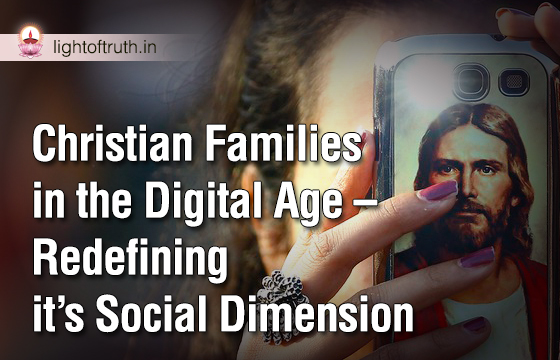Azadi ka Amrit Mahotsav Kolkata event honours four Clergymen
Pope Francis asks businesses to support working women: They’re ‘afraid to get pregnant’
Study: Christianity may lose majority, plurality status in U.S. by 2070
Indian politician declines Magsaysay Award under party pressure
Like John Paul II, Pope Francis heads to Kazakhstan during time of war

Sanjose A Thomas
 Family is the basic unit of a society and it can be a rightly argued that without families there can be no human society. Mankind right from its inception had some form of arrangement which ensured the communion of men and women and towards its gradual march towards modernity we designated that arrangement as ‘family’.
Family is the basic unit of a society and it can be a rightly argued that without families there can be no human society. Mankind right from its inception had some form of arrangement which ensured the communion of men and women and towards its gradual march towards modernity we designated that arrangement as ‘family’.
The era of liberalization and digital revolution in the 1990s was a game changer in all walks of human life including that of the most personal and highly sensitive domains of it’s existence. Introduction of new communication devices and reduction in time and space created a new era of wired and non wired communication and social interaction. Society got redefined in itself and social relationships entered a phase of ‘nearer but farther’ phase whereby we came closer in terms of technological development and farther in terms of sensitivity and warmth in relationships. The impact of this was most profoundly felt in Christian formation too as the changing technological scenario altogether altered the existing strategies of Christian socialization. The proliferation of social media platforms and the emergence of an ever mushrooming IT industry created a euphoria which dwarfed the role of family as an agency of strong Christian foundation.
Our younger generation had a radical face off with such gadgets and devices including the smartphone and a plethora of applications and the vistas and horizons of their knowledge and social interaction changed almost unendingly in the 21st century. In such a context the role of family got slackened in the context of character formation of a youngster/child including his /her Christian formation. In his address given to the World Youth Summit Pope Francis exhorted the youth in the church to engage themselves with the digital revolution and at the same time remember and cherish their Catholic faith which they received as the greatest gift from their families. The role of family in the digital age should be redefined and it should be perceived as that of a facilitator of Christian values and not that of an agency of Christian formation alone. We have experienced the pandemic and we despite all difficulties switched our catechism sessions from classroom to online rooms and tried to maintain the same degree of intensity and depth of catechetic teaching irrespective of the fact that it was in the digital platform. The same is applicable in the case of our family based formation too as we need to adapt with the changing times and should realign our value imparting process.
Kerala society with its enhanced exposure to globalization and liberalization and it’s high rate of migration witnessed the most drastic and dramatic changes in all walks of life including its domain of religion and faith. Church in Kerala with it’s long history and contributions in Kerala renaissance also witnessed and experienced drastic changes especially in the last two decades. This has touched almost all social institutions in Kerala including the Christian family and community life. As a result of this we are facing an unprecedented transformation in the formation of social and cultural identity of our youth and children. In this changing social milieu what is required on our side is to exhibit a considerable degree of flexibility and adaptability to the changing realities and to augment our familial agency in tune with this change. Say for example many often we take a very conservative and orthodox approach to inter religious and inter-caste marriages and make hue and cry in relation with the same. Today in this 21st century our children has a very high degree of social interface with people belonging to almost all religions and sects both educationally and professionally and instead of taking such a narrow position and even lamenting over different types of ‘jihad’ we must make them understand the underlying problems of such relationships and must encourage them to build healthy friendships beyond boundaries of religion. This is where family can make a difference and can create a model. This same idea of openness, alertness and inclusiveness should be carefully nurtured by Christian and Catholic families which can work wonders especially in the new digital age. ‘Practice what you preach’ should become the motto of Christian families in the 21st century and our practice should match our perceptions about society, youngsters and about our Christian values and it’s formation. Tertio Millenio Adveniente (Apostolic Letter) published by Pope John Paul IInd way back in 1994 strongly reverberates the need to move forward to the 21st century by cultivating a strong Christian familial bond which can only sustain and promote our faith and its effectiveness and can sustain it despite all challenges of the new millennium.
Leave a Comment